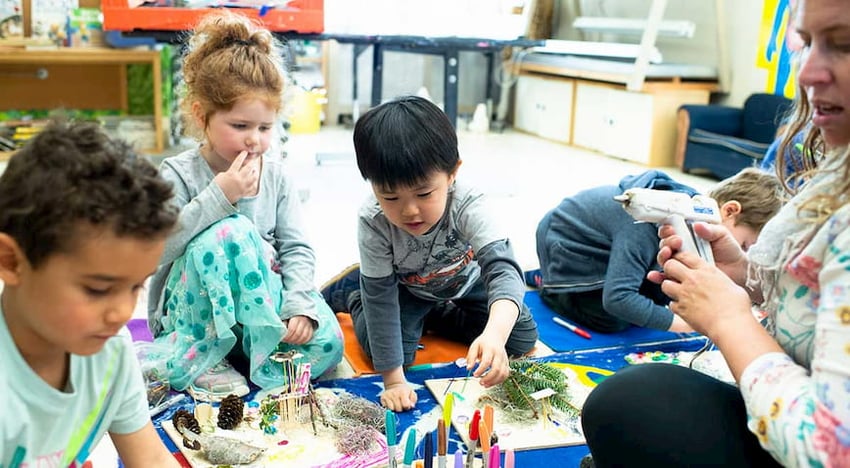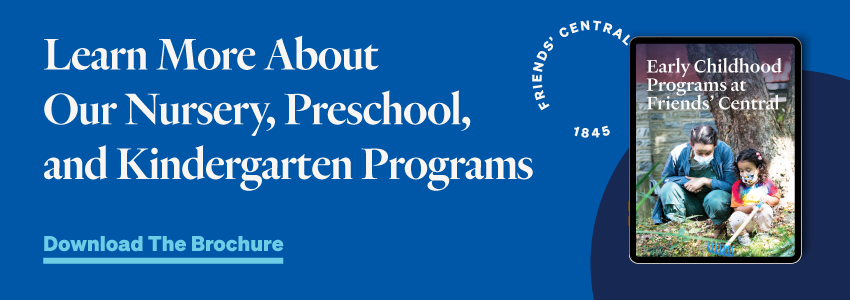
Choosing a preschool for your child to attend can be a difficult one. In addition to thinking about their safety and happiness, you are probably also considering other factors, such as academics, student success, cost, accreditation, etc.
One element that is crucial to nurture a happy, well-formed child—but which often gets overlooked in the search for a preschool—is the idea of playful discovery, and creativity.Want to learn more about Friends' Central early childhood education programs? Get the free guide!
Facilitated, playful learning is as important to intellectual and personal growth as academic support and success. For this reason, many parents choose play-based preschool programs that nurture this sense of discovery from the very outset of their child’s education.
The Importance of Play in Preschool
Play-based preschool programs are centered on the individual child and their interests.
Play-based classrooms are often broken into different “centers” that nurture particular interests and areas of childhood development, and allow children to choose their own daily activities.
Common areas of exploration in play-based preschools include:
- Home areas with domestic and kitchen settings
- Science and technology areas
- Reading spaces
- Water and/or sand tables
- Areas for imaginative play
Teachers encourage students to explore and play on their own in these various areas. At Friends’ Central School, we believe that when students are allowed to be discoverers and explorers, and when teachers act as facilitators, flexible and creative thinking happens. When children are encouraged to explore without intrinsic goals, they become problem solvers, they gain confidence and develop their social skills as they learn to collaborate with one another.
Moreover, children are greatly motivated by the notion of play. Using play as both the context for learning, and the driver for discovery, a play-based learning environment can instill in children a zeal and enthusiasm for learning they might not experience otherwise. Through playful discovery, children can find joy in learning they might not otherwise in a traditional educational setting.
How Does Play Enhance a Child's Development?
1. Communication Skills
Play helps children develop key language and communication skills. When playing with other children and adults, children learn to both communicate effectively, and listen intently. And during these early years, when a child’s vocabulary is rapidly growing, participating in teacher-led play where their conversation is encouraged in a natural way can be especially effective in boosting their communication skills.
Even participating in individual play, where the child is guiding their own narrative, encourages communication growth. Often, children will speak to themselves and the toys they’re playing with, enacting multiple sides of conversation, and participating in active-language scenarios.
2. Motor Skills
Active play also quickly works to develop strong motor skills in children:
- Activities like running, jumping, and throwing help children develop strong gross motor skills.
- Participating in sports, climbing, and skipping require core strength, hand-eye coordination, and encourages a strong sense of balance,
- Coloring, drawing and crafting encourages and develops fine motor skills.
Your child might look like they’re just enjoying the monkey bars with their friends, but their body is doing real work and developing the essential strengths that will help them grow.
3. Social and Emotional Development
Unsurprisingly, play-based learning also plays an important role in the development of healthy social habits and emotional skills in children. When children play with other children, they learn to cooperate, communicate and engage with their peers in a way that ensures they feel part of their young community. These interactions give them the ability to develop relationships, and nurtures their sense of emotional and social intelligence.
Educators that facilitate this type of play-based learning, like the ones at the Friends’ Central Nursery Program, can encourage children to work through common emotions and scenarios - both positive and negative—which in turn strengthens the way they are able to interact and cope with the world around them. When they are playing ‘family’ or ‘doctor’, they are demonstrating empathy, responsibility, and an awareness of their relationships with those around them.
Playing also serves a purpose we too often overlook - stress relief. While children might not communicate stress in the way most adults do, they are constantly internalizing elements of their environment. Play acts as a form of therapy, and participating in calm, facilitated play allows them to work through their stressors in a healthy, productive way.
4. Creativity and Imagination
Creativity and Imaginations may seem like hallmarks of childhood, but they are important skills that are learned—not inherit. Play and playful learning, foster this sense of creativity, and allow children to navigate so many scenarios in their lives—both real and imagined.
Whether they are pretending to be a doctor, acting like the mother to their teddy bear “babies”, or flying a cardboard box airplane, children are acting as creative problem-solvers, and demonstrating the skills that come naturally to them. Likewise, they develop the ability to see potential in the world around them, while baking cookies with playdough, and turning blankets into capes. This imaginative play quickly forms the foundation of a healthy childhood, and sets them up to become creative, curious adults who can adapt to the world around them.
5. Critical Thinking and Problem Solving
As children interact with the world around them, especially in ways that inspire their creativity and critical thinking skills, they learn to become effective problem solvers. From planting seeds in their community garden, to helping bandage and imaginary scrape, to reading about others’ joys and pitfalls, they see cause and effect, and begin to notice both the patterns around them, and the consequences of actions, both simple and complex. They see connections between themselves and their surroundings, and the lives of those around them. They begin to predict outcomes, and start to consider a variety of choices and actions.
These simple, but impactful, exercises are opportunities that guided, play-based learning present as a way of constantly and consistently developing the critical thinking skills of preschoolers, and lay the foundation for strong future problem solvers!
What Are The Intellectual Benefits of Play?
Ultimately, parents want to ensure that their children have a happy, healthy educational experience. And while test scores and an ambition curriculum are often the focus of searches when looking at schools, the importance of play-based preschool programs cannot be underestimated.
Students who begin their education in an environment of playful learning and discovery emerge as more confident, imaginative, socially aware individuals. Through this play-based approach, students are able to successfully develop critical cognitive skills and language skills for the social interactions they will surely encounter in the future. It also provides opportunities for children to take an active role in their academic learning by integrating the critical thinking and communication skills that make them curious, well-rounded, and successful members of their communities.
To learn more about the ways that a Friends’ Central education empowers our youngest learners through play-based learning, families are invited to speak to an admissions counselor or visit the campus to explore all it has to offer.


